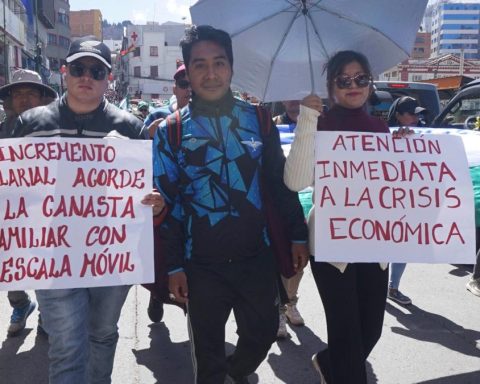Forrest Gander was one of the figures of the last Santa Cruz Book Fair. The American author won the prestigious Pulitzer Prize for poetry last year for his book Twice alive. Also, Gander is a translator (with his friend Kent Johnson) of the poetry of Jaime Sáenz. His work has been translated in Mexico, Spain and Chile. Very little has been translated, she says, but that’s fine with her, “because in the US the forces are always dominating all the other countries and it’s time to receive what the other countries have to offer us,” he said. EL DEBER had a few minutes to interview him during his stay in Santa Cruz.
How did you discover the work of Jaime Sáenz?
For my friend Kent Johnson, who lived in Montevideo, Uruguay. Discovering his poetry touched me deeply, deeply. And now, in the United States, after our two translations, I have noticed an enthusiasm for Saenz’s work in various parts of the country. There is a lot of attention on Sáenz, and in my new book, which is called Twice aliveI am not mentioning Sáenz but I am mentioning Julio de la Vega, his book lichen season influenced mine. Both are focused on privacy and lichens.
What interested you in Sáenz’s work?
His voice. His meditative voice. I also like that he wasn’t forced to follow rational models in his literature. He is a visionary poet. And when he says “you” in his poems, he is referring to the city of La Paz, to death, to the lover. He also refers to all the “you” inside each person, because for him one person contains all.
You have also translated other Latin American authors. What interests you about the poetry of this region that you may not find in that of your country?
There are other forms of rhythm, of images, of sounds, that we don’t have in the United States. There is an energy in Latin American poetry that we need in the United States. There is another tradition here.
Do you know other Bolivian authors that you like?
Nicómedes Suárez is a very interesting poet. Edward Miter. I also like.
What did a prize like the Pulitzer mean to you?
It is obviously a very great honour. It changed the international interest towards my own work. At the same time it was very strange, because I received a very large award for a book that is about mourning. It was dedicated to my wife, who passed away. It was very difficult because I couldn’t share my joy with the only person I would have loved to share it with. It’s complex, but she would be very proud of me.
In what place would you place your poetry within all the literature of the United States?
I have an interest, like many poets in the world now, in ecology, in the natural disasters that we are currently experiencing. In that journey I can consider myself an ‘ecopoeta’, but other people call me ‘experimental poet’, although I don’t like that expression, because I believe that all important art takes risks. I am very interested in exploring and expanding what I know. That’s why all my books are different, because I don’t want to repeat what I can do.
It’s hard not to repeat…
Yes, but I’m always looking for authors elsewhere who don’t always repeat their work.
Which authors have influenced you a lot throughout your literary career?
Raúl Zurita is one. His poetry also takes many risks. It is somehow experimental and at the same time full of emotions and very accessible to everyone. Of course Nicanor Parra, who was, like me, a geological engineer. Parra changed the trajectory of poetry in Latin America after Neruda. Here in Bolivia, Jaime Sáenz, without a doubt; also Julio de la Vega.
Why did you decide to study Geology? Did you ever practice?
I am the only man in my family. My father left when I was young. I have two sisters and my mother passed away two years ago. Back then I had a sense of responsibility, so studying Geology, I thought I could find a very responsible job. After I got out of college I got cancer, it was very serious. When I was in the hospital, thinking about the possibility of not having a very long life, I decided that what I wanted to do more than anything in life was write. And when I got my health back I went to California to study poetry in San Francisco, where there is a very famous community of poets.
That’s why I’m also interested in the term ‘ecopoesy’, because we have to pay attention to the world we live in, and what Geology taught me was how to look in two ways. You have to know how to look at the big picture: the mountains and the structures, but at the same time you don’t know anything until you understand what happens in the microscopic crystalline structures. And it is and it is also a way of writing, it is my way of thinking: going through those two ways.
Forrest Gander was one of the figures of the last Santa Cruz Book Fair. The American author won the prestigious Pulitzer Prize for poetry last year for his book Twice alive. Also, Gander is a translator (with his friend Kent Johnson) of the poetry of Jaime Sáenz. His work has been translated in Mexico, Spain and Chile. Very little has been translated, she says, but that’s fine with her, “because in the US the forces are always dominating all the other countries and it’s time to receive what the other countries have to offer us,” he said. EL DEBER had a few minutes to interview him during his stay in Santa Cruz.
How did you discover the work of Jaime Sáenz?
For my friend Kent Johnson, who lived in Montevideo, Uruguay. Discovering his poetry touched me deeply, deeply. And now, in the United States, after our two translations, I have noticed an enthusiasm for Saenz’s work in various parts of the country. There is a lot of attention on Sáenz, and in my new book, which is called Twice aliveI am not mentioning Sáenz but I am mentioning Julio de la Vega, his book lichen season influenced mine. Both are focused on privacy and lichens.
What interested you in Sáenz’s work?
His voice. His meditative voice. I also like that he wasn’t forced to follow rational models in his literature. He is a visionary poet. And when he says “you” in his poems, he is referring to the city of La Paz, to death, to the lover. He also refers to all the “you” inside each person, because for him one person contains all.
You have also translated other Latin American authors. What interests you about the poetry of this region that you may not find in that of your country?
There are other forms of rhythm, of images, of sounds, that we don’t have in the United States. There is an energy in Latin American poetry that we need in the United States. There is another tradition here.
Do you know other Bolivian authors that you like?
Nicómedes Suárez is a very interesting poet. Edward Miter. I also like.
What did a prize like the Pulitzer mean to you?
It is obviously a very great honour. It changed the international interest towards my own work. At the same time it was very strange, because I received a very large award for a book that is about mourning. It was dedicated to my wife, who passed away. It was very difficult because I couldn’t share my joy with the only person I would have loved to share it with. It’s complex, but she would be very proud of me.
In what place would you place your poetry within all the literature of the United States?
I have an interest, like many poets in the world now, in ecology, in the natural disasters that we are currently experiencing. In that journey I can consider myself an ‘ecopoeta’, but other people call me ‘experimental poet’, although I don’t like that expression, because I believe that all important art takes risks. I am very interested in exploring and expanding what I know. That’s why all my books are different, because I don’t want to repeat what I can do.
It’s hard not to repeat…
Yes, but I’m always looking for authors elsewhere who don’t always repeat their work.
Which authors have influenced you a lot throughout your literary career?
Raúl Zurita is one. His poetry also takes many risks. It is somehow experimental and at the same time full of emotions and very accessible to everyone. Of course Nicanor Parra, who was, like me, a geological engineer. Parra changed the trajectory of poetry in Latin America after Neruda. Here in Bolivia, Jaime Sáenz, without a doubt; also Julio de la Vega.
Why did you decide to study Geology? Did you ever practice?
I am the only man in my family. My father left when I was young. I have two sisters and my mother passed away two years ago. Back then I had a sense of responsibility, so studying Geology, I thought I could find a very responsible job. After I got out of college I got cancer, it was very serious. When I was in the hospital, thinking about the possibility of not having a very long life, I decided that what I wanted to do more than anything in life was write. And when I got my health back I went to California to study poetry in San Francisco, where there is a very famous community of poets.
That’s why I’m also interested in the term ‘ecopoesy’, because we have to pay attention to the world we live in, and what Geology taught me was how to look in two ways. You have to know how to look at the big picture: the mountains and the structures, but at the same time you don’t know anything until you understand what happens in the microscopic crystalline structures. And it is and it is also a way of writing, it is my way of thinking: going through those two ways.
;
















